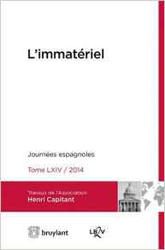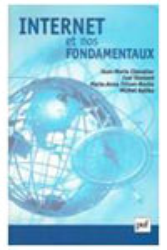Dec. 16, 2015
Thesaurus : Doctrine

Full reference : Association Henri Capitant, L'immatériel, Journées espagnoles, t. LXIV/2014, Bruylant, 2015, 1130 p.
Read the synthesis report by Rémy Cabrillac.
See the general presentation by Matthias Lehmann on Contrat et immatériel
Updated: July 31, 2013 (Initial publication: Oct. 4, 2011)
Teachings : Les Grandes Questions du Droit, semestre d'automne 2011

Nov. 1, 2000
Publications

► Full Reference: J.-M. Chevalier, I. Ekeland, M.-A. Frison-Roche & M. Kalika, Internet et nos fondamentaux ("Internet and our Fondamentals"), PUF, 2000, 128 p.
____
► English general presentation of this book and its summary: The Internet creates an impression of extreme novelty. Indeed, the fundamentals, have changed, as much in economics, management as in law. e-management, e-commerce, e-finance: all disciplines must rebuild their rules, so that the behaviours of actors are in a new way framed.
The Internet is not just a new way of communicating. It introduces new behaviours, new rules, some say a new world, perhaps a new life for pioneers of a new kind. This impression of extreme newness is the sign of a revolution, because the facts about the Internet do not seem to be explainable by any previously established rule: the principles to which we must refer have changed, the fundamentals that enable us to translate the world into abstractions, to understand it and to dominate it, are in mutation.
How can we understand the Internet? Not necessarily by delving into its technical and everyday aspects, but by confronting it with the fundamentals of the various disciplines in order to measure which key notions the Internet is abusing, which it is destroying and which it is imposing. What remains of our ways of thinking and practising science, law, economics and management? What are these disciplines built on? How can we understand them and bring them together again, under the impact of the Internet? The ambition of this book is to shed light on these new fundamentals, to tackle the conceptual revolution that Internet technology is bringing with it.
____
Content :
Introduction, p.7
Internet et la recherche en sciences exactes et naturelles ("The Internet and research in the natural sciences"), p.19
Les bouleversements du droit par Internet ("The upheaval of law caused by the Internet"), p. 37
Les fondements des sciences économiques interpellés par Internent ("The foundations of economics challenged by the Internet"), p.77
Internet et les sciences de gestion : l’émergence du e-management ("The Internet and management sciences: the emergence of e-management"), p. 103
________
June 15, 1999
Publications
► Référence complète : M.-A. Frison-Roche, "L’immatériel à travers la virtualité", in Archives de Philosophie du Droit (APD), Le droit et l’immatériel, t.43, 1999, Sirey, pp.139-148.
____
► Résumé de l'article : Après avoir rappelé que le Droit lui-même est un système virtuel en tant qu'il ne peut prendre en charge et gouverner les concrétudes que par l'abstraction, l'article distingue deux sortes de virtualités. La première est celle qui permet au Droit de régir immédiatement le futur en prenant la réalité concrète présente et en y discernant son futur (la dynamis aristotéliscienne), ce qui lui permet de gouverner le futur.
Ainsi alors que le Législateur par nature régir le Futur parce qu'il en aurait seul le pouvoir légitime (prohibition des pactes sur succession future), en déplaçant ainsi la vision de la situation présente, les parties elles-mêmes peuvent se saisir de la situation future, si celle-ci est déjà présente. L'exemple de la vente en l'état futur d'achèvement ou de la vente de bois coupé, vente mobilière réalisée au moment où l'arbre est encore enraciné. Mais le Droit demeure très prudent dans ce déplacement car l'on ne connait pas le futur (jurisprudence sur la perte de chance) et il faut être sûr de la présence de ce futur dans le présent.
L'autre hypothèse de virtualité, saisie davantage par la conception platonicienne, est celle du reflet. Il existe désormais des objets "virtuels". Ils le sont définitivement, l'écoulement du temps ne les modifiant pas. Il s'agit des hologrammes et des multiples représentations du monde qui constituent désormais des objets autonomes de celui-ci et ayant une valeur propre. De cette virtualité aussi, le Droit doit se saisir;
Le Droit a plus de mal à se saisir de la seconde virtualité que de la première, par exemple sur le terrain probatoire. Il convient de distinguer soigneusement les deux sens et de ne pas mêler le premier, solide et portant sur des biens corporels en devenir, et le second, plus hasardeux et portant sur des biens définitivement "virtuels" plein d'avenir.
________